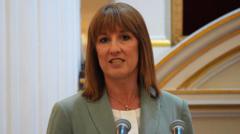Should the UK Economy Assessments Be Reduced to Just One Annually?

UK Government Finances: Annual Assessment and Policy Stability
The International Monetary Fund (IMF) has recently suggested that the UK government should assess its finances only once a year to avoid "overly frequent" changes to policy. This recommendation comes amidst a backdrop of economic uncertainty and rising global borrowing rates, which have influenced recent government decisions regarding public spending and welfare. By moving to a single annual budget, the government aims to enhance policy stability and foster a more predictable economic environment.
Currently, the UK's independent forecaster, the Office for Budget Responsibility (OBR), produces two forecasts annually. These forecasts are critical as they evaluate the government's economic health and determine whether it is on course to meet its borrowing limits. The complexity of these frequent assessments can lead to reactive measures, as witnessed this year when Chancellor Rachel Reeves announced £5 billion in health-related welfare cuts due to changing economic forecasts.
The Impact of Frequent Assessments on Policy Making
Frequent assessments of the UK government's finances can lead to a cycle of reactive policymaking. This cycle often results in hasty decisions that may not consider the long-term implications for the economy. The IMF has noted that allowing greater flexibility around financial targets could prevent small fluctuations in economic forecasts from significantly impacting policy compliance. This flexibility could potentially lead to a more stable fiscal environment.
One notable instance of this reactive policymaking occurred when the Chancellor announced welfare cuts in response to an updated economic forecast, only to reverse those cuts following a revolt from Labour backbenchers. This incident highlights the pitfalls of constant adjustments to fiscal policy, which can create uncertainty in public services and welfare programs.
Recommendation for a Single Annual Budget
The IMF's recommendation aligns with ongoing discussions within the UK government about implementing a single annual budget. This proposal aims to streamline financial assessments and create a more stable policy framework. The Institute for Fiscal Studies has echoed this sentiment, suggesting that the government should downplay the Spring Statement and adopt a looser borrowing target to minimize the need for continuous adjustments to tax and spending plans.
By concentrating fiscal assessments into one comprehensive review each year, the government can provide more clarity and predictability for businesses, investors, and the general public. This approach could help mitigate the risks associated with frequent policy changes and foster a more conducive environment for economic growth.
Chancellor's Fiscal Rules and Economic Growth
Chancellor Rachel Reeves has emphasized her commitment to two main fiscal rules that she considers "non-negotiable". These rules are designed to ensure fiscal responsibility while enabling the government to invest in the economy's renewal. The IMF has praised these fiscal rules, acknowledging their role in maintaining a credible medium-term borrowing plan.
The IMF’s endorsement of the UK's economic direction is significant. The organization noted that the UK's recent "bold agenda" of pro-growth reforms positions the country to navigate current global uncertainties effectively. This endorsement suggests that, with careful management, the UK can sustain its economic recovery and growth even amidst a volatile global landscape.
Preparing for Economic Shocks
The IMF has also provided insights on how the UK government can prepare for potential economic shocks. Key strategies recommended include:
- Reviewing the state pension triple lock, which guarantees that pensions rise by a minimum of 2.5% each year.
- Widening the applicability of Value Added Tax (VAT) to broaden the tax base.
- Means-testing more benefits to target support effectively.
- Implementing co-payments for wealthier users of the National Health Service (NHS) to alleviate financial pressure on the public health system.
These strategies could provide a framework for the government to adapt to economic fluctuations while maintaining a focus on fiscal discipline. By considering these recommendations, the government can build a more resilient economy capable of withstanding external shocks.
Conclusion: A Path Forward for UK Finances
As the UK navigates the complexities of its financial landscape, the IMF's recommendations highlight the importance of adopting a more measured approach to fiscal assessments. By moving toward a single annual budget and allowing for greater flexibility in financial targets, the government can enhance policy stability and promote long-term economic growth.
Chancellor Reeves' commitment to her fiscal rules underscores the government's intent to confront deep-rooted economic challenges while investing in the future. As the UK prepares for potential economic headwinds, it is crucial for policymakers to consider innovative strategies that foster resilience and adaptability.
FAQs
Why does the IMF recommend annual assessments for UK finances?
The IMF believes that annual assessments would reduce the likelihood of overly frequent policy changes that can create uncertainty and instability in the economy.
What are the current fiscal rules set by Chancellor Rachel Reeves?
Chancellor Reeves has established two main fiscal rules considered "non-negotiable", focusing on fiscal responsibility while allowing for strategic investments in economic growth.
How could the UK government prepare for economic shocks?
The IMF suggests strategies such as reviewing the state pension system, adjusting VAT applicability, means-testing benefits, and introducing co-payments for wealthier NHS users.
The recommendations provided by the IMF could significantly shape the future of UK economic policy. As the government navigates these recommendations, how will it balance the need for fiscal responsibility with the growing demands of public services? #UKEconomy #FiscalPolicy #IMFRecommendations
```Published: 2025-07-25 12:10:05 | Category: technology



